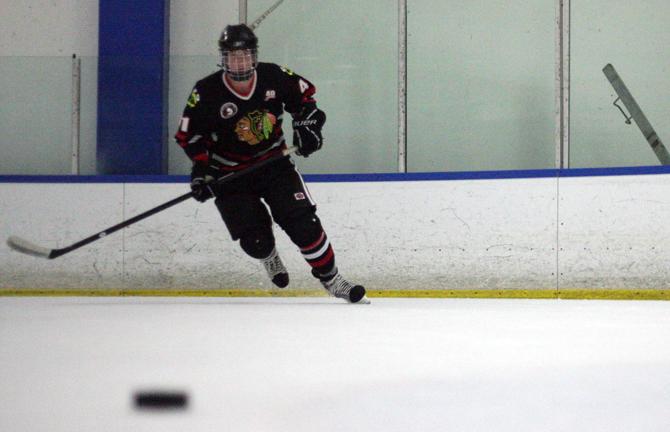“David and his older brother, on roller blades, would go down the hill on Bubb Road at high speeds towards his grandparents’ house,” Christian said. “They would give me heart attacks.”
At his father’s insistence, David gave up the practice of careening down slopes and redirected his attention to street hockey on roller blades instead. Christian noticed that David handled the sport well, so when a family friend suggested that Olsson try ice hockey, Christian agreed that it seemed like something David would excel in. And the moment he stepped onto the ice, blades on, stick in hand, nine-year-old David knew he had found his passion.
“I loved the speed of the sport, and the intensity,” David said. “I find it interesting. It’s so different from other sports.”
He caught on right away as he practiced at the ice rink in Cupertino Square, quickly mastering the basics of ice hockey. Encouraged by his father and the rest of his family, David landed a roster spot on his first club hockey team, the San Jose Junior Sharks, at the age of 10. From then on, he could never get enough of the sport.
“Once hockey began, all other sports stopped,” Christian said. “Hockey became his life.”
The dedication begins
After several seasons with the Junior Sharks, David earned a position as left wing on the Santa Clara Blackhawks, a prestigious team that travels extensively around Calif. For the next few years, he went back and forth between the Junior Sharks and the Blackhawks. He finally decided on the Blackhawks, the team he has been a part of for three years, because they gave him the opportunity to play at a higher level — when he first joined the Blackhawks, they allowed him to compete in the 18-year-old age group even though he was only 16. David put in long hours of practice, determined to be a standout player, and his new team rewarded him with something that hundreds of youth ice hockey teams fought for.
“We won [the California Amateur Hockey Association] States [championship] last year,” David said. “It was the best moment ever.”
And everything that happens on the ice — from sudden death wins and missed goals to the brawls and the adrenaline that courses through his veins as he plays — fuels his unbreakable devotion for the game he has fallen in love with.
But despite his love for the sport, David admits that hockey often takes its toll on him and his family. Fees for club teams average several thousand dollars per season, not to mention the constant travel and equipment expenses.
“In Sweden, Canada and Russia, where ice hockey is popular, renting a full-sized sheet of ice costs about $50 per hour,” Christian said. “But in America, it’s $350 an hour.”
Christian also explained that because hockey is not very widely played in the Bay Area, David must commute regularly to Fremont and San Jose to play on full-sized ice rinks.
The large amount of time that David spends training is also time taken away from other things, namely schoolwork. But amidst the grueling workouts and frustrating games, he is not alone. David says that his parents regularly attend his games, never question his commitment and are determined to help in any way they can.
“As a parent, the number one priority is school,” Christian said. “But in a team sport, you sign up to attend. You can do well in school and be a team member [at the same time].”
An athletic future
David, who only knows two other students on campus who ever played competitive ice hockey — senior James Kang, who no longer plays, and junior Mark McDowell, who recently transferred to a Florida college preparatory academy to pursue his ice hockey career — understands that hockey is not the most prominent high school sport. But studies show that ice hockey is the second-fastest growing sport in the nation. To David, that is both a blessing and a curse. Increasing popularity pushes college scouts to seek exceptional players more actively and offer more scholarships, but it also means tougher competition as more and more people join ice hockey.
According to the National Collegiate Athletic Association (NCAA), 10.8 percent of male high school hockey players currently continue the sport in college. Given his success with the Blackhawks, David cannot bear to part with what may very well define him, so he expects to play hockey in college, mostly likely not with a school’s NCAA program but rather on a club team — something he believes will enhance his studies and keep his college life well-balanced in general.
“[Hockey] is a big de-stresser,” David said. “The speed, the quick decisions, and especially the contact just takes your mind off everything.”
A life shaped by the ice
“[Hockey has] taught me a lot of valuable lessons,” David said. “I apply [it] to school … and anything else I partake in like work ethic, discipline, teamwork, dedication, and what it takes to reach a goal.”
Those who know him would agree — many of David’s friends and family have noticed a transformation since David has started hockey.
“He’s built up strength and self-confidence,” Christian added. “Also, he’s learned a lot about time management. Obviously, he’s still a teenager, but he does very well.”
Senior Joey Shepard, who has been friends with David for seven years, also noted that David’s passion for hockey makes an appearance in everyday activities.
“I believe hockey has sort of affected the way he walks,” Shepard said, trying to suppress a laugh. “We sometimes joke around [about] how it looks like he’s ice skating when he’s walking.”
And though eight years of hockey experience is a lot to reflect on, David manages to sum it up in nine short words.
“I love hockey,” he said. “It’s a big part of me.”





